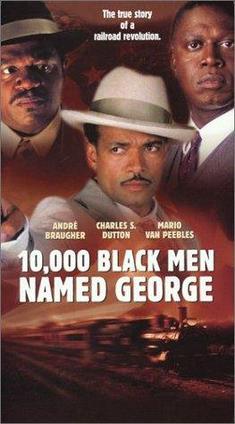10,000 Black Men Named George
10,000 Black Men Named George was a 2002 award-winning, made-for-TV film, not a documentary. With grasping and capable course, composing and acting, the movie not only brought to life the 12-year organizing struggle (1925–1937) for the first all-Black union, the Brotherhood of Sleeping Car Porters. It brings up story of power, wisdom and intricacies of Black people battling for higher wages, better working conditions and pride at work against an organization and a bigoted class framework stacked against them[1]
Synopsis
Asa Philip Randolph, a Black writer and socialist attempting to set up a voice for these forgotten laborers, consents to battle for the Pullman porters’ forms black union in America. Occupations and lives would be put in danger in the endeavor to acquire 10,000 marks of the men referred to just as "George."[2]
Black Empowerment
The film underlined the vital job of Black specialists and Black people group in the battle for financial equity and the battle against bigotry which could be the new soul to battle for Black Lives Matter. Perhaps the most captivating and pertinent scenes in "10,000 Black Men Named George" comes when Totten searches out Randolph to persuade him to lead the getting sorted out drive for an autonomous association. Randolph asks Totten "Do you think America is prepared for a hued association?" Totten's answer exemplifies the Black opportunity battle throughout the previous 400 years. Totten reacts, "I don't think America is prepared for anything. Except if we prepare them."
Controversy
At the beginning of the film, there's a scene where they point out a stereotypes about white women using their whiteness and femininity as a weapon against Black men. The racist trope that Black men are somehow a threat to or dangerously attracted to white women has been reproduced among white men and women through the generations. As the film start, a white lady traveler accomplishing something unlawful, taking Pullman towels, which is seen by a white-jacketed Black doorman. In the high level, and some of the time risky, calculus of white women/black men relations, the doorman needs to sort out what to do. Say something or not. He will get docked pay for missing Pullman property. At the point when watchman converse with her, the lady call the conductor and blame doorman for undermining her and requests assurance, which prompts terminating.[3] Not only is the porter being ripped off by the company and losing compensation yet the bigger bigoted codes are at work in the workplace. Social and monetary elements need to be faced by Black people in the working environment on an hourly premise.
